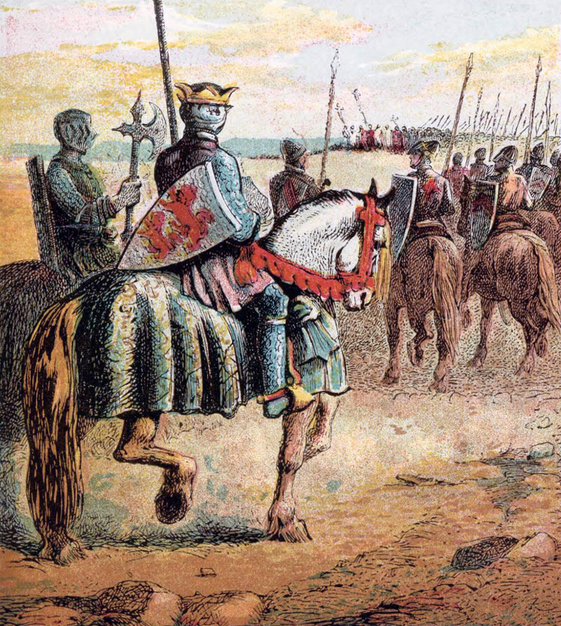Editor’s Note: This is the third chapter of William the Conqueror, by Jacob Abbot (published 1877).
III. The Accession
After spending a little time at Paris, Robert took leave of the king, and of William his son, and went forth, with a train of attendant knights, on his pilgrimage. He had a great variety of adventures, which can not be related here, as it is the history of the son, and not of the father, which is the subject of this narrative. Though he traveled strictly as a pilgrim, it was still with great pomp and parade. After visiting Rome, and accomplishing various services and duties connected with his pilgrimage there, he laid aside his pilgrim’s garb, and, assuming his proper rank as a great Norman chieftain, he went to Constantinople, where he made a great display of his wealth and magnificence. At the time of the grand procession, for example, by which he entered the city of Constantinople, he rode a mule, which, besides being gorgeously caparisoned, had shoes of gold instead of iron; and these shoes were purposely attached so slightly to the hoofs, that they were shaken off as the animal walked along, to be picked up by the populace. This was to impress them with grand ideas of the rider’s wealth and splendor. After leaving Constantinople, Robert resumed his pilgrim’s garb, and went on toward the Holy Land.
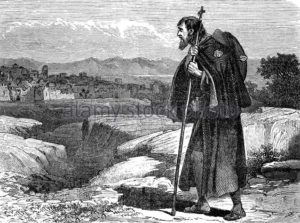
The journey, however, did not pass without the usual vicissitudes of so long an absence and so distant a pilgrimage. At one time Robert was sick, and, after lingering for some time in a fever, he so far recovered his strength as to be borne on a litter by the strength of other men, though he could not advance himself, either on horseback or on foot; and as for traveling carriages, there had been no such invention in those days. They made arrangements, therefore, for carrying the duke on a litter. There were sixteen Moorish slaves employed to serve as his bearers. This company was divided into sets, four in each, the several sets taking the burden in rotation. Robert and his attendant knights looked down with great contempt on these black pagan slaves. One day the cavalcade was met by a Norman who was returning home to Normandy after having accomplished his pilgrimage. He asked Duke Robert if he had any message to send to his friends at home.
“Yes,” said he; “tell them you saw me here, on my way to Paradise, carried by sixteen demons.”
Robert reached Jerusalem, and set out on his return; and soon after rumors came back to Paris that he had died on his way home. The accounts of the manner of his death were contradictory and uncertain; but the fact was soon made sure, and the news produced every where a great sensation. It soon appeared that the brothers and cousins of Robert, who had claimed the right to succeed him in preference to his son William, had only suspended their claims—they had not abandoned them. They began to gather their forces, each in his own separate domain, and to prepare to take the field, if necessary, in vindication of what they considered their rights to the inheritance. In a word, their oaths of fealty to William were all forgotten, and each claimant was intent only on getting possession himself of the ducal crown.
In the mean time, William himself was at Paris, and only eleven years of age. He had been receiving a careful education there, and was a very prepossessing and accomplished young prince. Still, he was yet but a mere boy. He had been under the care of a military tutor, whose name was Theroulde. Theroulde was a veteran soldier, who had long been in the employ of the King of France. He took great interest in his young pupil’s progress. He taught him to ride and to practice all the evolutions of horsemanship which were required by the tactics of those days. He trained him, too, in the use of arms, the bow and arrow, the javelin, the sword, the spear, and accustomed him to wear, and to exercise in, the armor of steel with which warriors were used, in those days, to load themselves in going into battle. Young princes like William had suits of this armor made for them, of small size, which they were accustomed to wear in private in their military exercises and trainings, and to appear in, publicly, on great occasions of state. These dresses of iron were of course very heavy and uncomfortable, but the young princes and dukes were, nevertheless, very proud and happy to wear them.
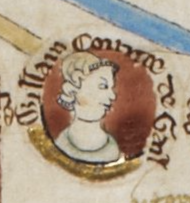
While William was thus engaged in pursuing his military education in Paris, several competitors for his dukedom immediately appeared in Normandy and took the field. The strongest and most prominent among them was the Earl of Arques. His name was William too, but, to distinguish him from the young duke, we shall call him Arques. He was a brother of Robert, and maintained that, as Robert left no lawful heir, he was indisputably entitled to succeed him. Arques assembled his forces and prepared to take possession of the country.
It will be recollected that Robert, when he left Normandy in setting out on his pilgrimage, had appointed a nobleman named Alan to act as regent, or governor of the country, until he should return; or, in case he should never return, until William should become of age. Alan had a council of officers, called the council of regency, with whose aid he managed the administration of the government. This council, with Alan at their head, proclaimed young William duke, and immediately began to act in his name. When they found that the Earl of Arques was preparing to seize the government, they began to assemble their forces also, and thus both sides prepared for war.
Before they actually commenced hostilities, however, the pilgrim knights who had accompanied Robert on his pilgrimage, and who had been journeying home slowly by themselves ever since their leader’s death, arrived in Normandy. These were chieftains and nobles of high rank and influence, and each of the contending parties were eager to have them join their side. Besides the actual addition of force which these men could bring to the cause they should espouse, the moral support they would give to it was a very important consideration. Their having been on this long and dangerous pilgrimage invested them with a sort of romantic and religious interest in the minds of all the people, who looked up to them, in consequence of it, with a sort of veneration and awe; and then, as they had been selected by Robert to accompany him on his pilgrimage, and had gone on the long and dangerous journey with him, continuing to attend upon him until he died, they were naturally regarded as his most faithful and confidential friends. For these and similar reasons, it was obvious that the cause which they should espouse in the approaching contest would gain a large accession of moral power by their adhesion.
As soon as they arrived in Normandy, rejecting all proposals from other quarters, they joined young William’s cause with the utmost promptitude and decision. Alan received them at once into his councils. An assembly was convened, and the question was discussed whether William should be sent for to come to Normandy. Some argued that he was yet a mere boy, incapable of rendering them any real service in the impending contest, while he would be exposed, more perhaps than they themselves, to be taken captive or slain. They thought it best, therefore, that he should remain, for the present, in Paris, under the protection of the French king.
Others, on the other hand, contended that the influence of William’s presence, boy as he was, would animate and inspire all his followers, and awaken every where, throughout the country, a warm interest in his cause; that his very tenderness and helplessness would appeal strongly to every generous heart, and that his youthful accomplishments and personal charms would enlist thousands in his favor, who would forget, and perhaps abandon him, if he kept away. Besides, it was by no means certain that he was so safe as some might suppose in King Henry’s custody and power. King Henry might himself lay claims to the vacant duchy, with a view of bestowing it upon some favorite of his own, in which case he might confine young William in one of his castles, in an honorable, but still rigid and hopeless captivity, or treacherously destroy his life by the secret administration of poison.
These latter counsels prevailed. Alan and the nobles who were with him sent an embassage to the court of King Henry to bring William home. Henry made objections and difficulties. This alarmed the nobles. They feared that it would prove true that Henry himself had designs on Normandy. They sent a new embassage, with demands more urgent than before. Finally, after some time spent in negotiations and delays, King Henry concluded to yield, and William set out on his return. He was now about twelve or thirteen years old. His military tutor, Theroulde, accompanied him, and he was attended likewise by the ambassadors whom Alan had sent for him, and by a strong escort for his protection by the way. He arrived in safety at Alan’s head-quarters.
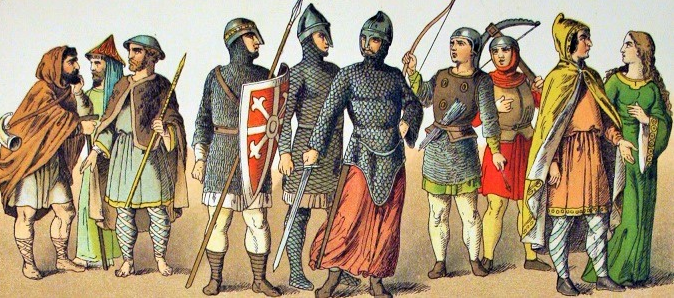
William’s presence in Normandy had the effect which had been anticipated from it. It awakened every where a great deal of enthusiasm in his favor. The soldiers were pleased to see how handsome their young commander was in form, and how finely he could ride. He was, in fact, a very superior equestrian for one so young. He was more fond, even, than other boys of horses; and as, of course, the most graceful and the fleetest horses which could be found were provided for him, and as Theroulde had given him the best and most complete instruction, he made a fine display as he rode swiftly through the camp, followed by veteran nobles, splendidly dressed and mounted, and happy to be in his train, while his own countenance beamed with a radiance in which native intelligence and beauty were heightened by the animation and excitement of pride and pleasure. In respect to the command of the army, of course the real power remained in Alan’s hands, but every thing was done in William’s name; and in respect to all external marks and symbols of sovereignty, the beautiful boy seemed to possess the supreme command; and as the sentiment of loyalty is always the strongest when the object which calls for the exercise of it is most helpless or frail, Alan found his power very much increased when he had this beautiful boy to exhibit as the true and rightful heir, in whose name and for whose benefit all his power was held.
Still, however, the country was very far from becoming settled. The Earl of Arques kept the field, and other claimants, too, strengthened themselves in their various castles and towns, as if preparing to resist. In those days, every separate district of the country was almost a separate realm, governed by its own baron, who lived, with his retainers, within his own castle walls, and ruled the land around him with a rod of iron. These barons were engaged in perpetual quarrels among themselves, each plundering the dominions of the rest, or making hostile incursions into the territories of a neighbor to revenge some real or imaginary wrong. This turbulence and disorder prevailed every where throughout Normandy at the time of William’s return. In the general confusion, William’s government scarcely knew who were his friends or his enemies. At one time, when a deputation was sent to some of the barons in William’s name, summoning them to come with their forces and join his standard, as they were in duty bound to do, they felt independent enough to send back word to him that they had “too much to do in settling their own quarrels to be able to pay any attention to his.”
In the course of a year or two, moreover, and while his own realm continued in this unsettled and distracted state, William became involved in what was almost a quarrel with King Henry himself. When he was fifteen years old, which was two or three years after his return from Paris to Normandy, Henry sent directions to William to come to a certain town, called Evreux, situated about half way between Falaise and Paris, and just within the confines of Normandy, to do homage to him there for his duchy. There was some doubt among William’s counselors whether it would be most prudent to obey or disobey this command. They finally concluded that it was best to obey. Grand preparations were accordingly made for the expedition; and, when all was ready, the young duke was conducted in great state, and with much pomp and parade, to meet his sovereign.
The interview between William and his sovereign, and the ceremonies connected with it, lasted some days. In the course of this time, William remained at Evreux, and was, in some sense, of course, in Henry’s power. William, having been so long in Henry’s court as a mere boy, accustomed all the time to look up to and obey Henry as a father, regarded him somewhat in that light now, and approached him with great deference and respect. Henry received him in a somewhat haughty and imperious manner, as if he considered him still under the same subjection as heretofore.
William had a fortress or castle on the frontiers of his dukedom, toward Henry’s dominions. The name of the castle was Tellières, and the governor of it was a faithful old soldier named De Crespin. William’s father, Robert, had intrusted De Crespin with the command of the castle, and given him a garrison to defend it. Henry now began to make complaint to William in respect to this castle. The garrison, he said, were continually making incursions into his dominions. William replied that he was very sorry that there was cause for such a complaint. He would inquire into it, and if the fact were really so, he would have the evil immediately corrected. Henry replied that that was not sufficient. “You must deliver up the castle to me,” he said, “to be destroyed.” William was indignant at such a demand; but he was so accustomed to obey implicitly whatever King Henry might require of him, that he sent the order to have the castle surrendered.
When, however, the order came to De Crespin, the governor of the castle, he refused to obey it. The fortress, he said, had been committed to his charge by Robert, duke of Normandy, and he should not give it up to the possession of any foreign power. When this answer was reported to William and his counselors, it made them still more indignant than before at the domineering tyranny of the command, and more disposed than ever to refuse obedience to it. Still William was in a great measure in the monarch’s power. On cool reflection, they perceived that resistance would then be vain. New and more authoritative orders were accordingly issued for the surrender of the castle. De Crespin now obeyed. He gave up the keys and withdrew with his garrison. William was then allowed to leave Evreux and return home, and soon afterward the castle was razed to the ground.
This affair produced, of course, a great deal of animosity and irritation between the governments of France and Normandy; and where such a state of feeling exists between two powers separated only by an imaginary line running through a populous and fertile country, aggressions from one side and from the other are sure to follow. These are soon succeeded by acts of retaliation and revenge, leading, in the end, to an open and general war. It was so now. Henry marched his armies into Normandy, seized towns, destroyed castles, and, where he was resisted by the people, he laid waste the country with fire and sword. He finally laid siege to the very castle of Falaise.
William and his government were for a time nearly overwhelmed with the tide of disaster and calamity. The tide turned, however, at length, and the fortune of war inclined in their favor. William rescued the town and castle of Falaise; it was in a very remarkable manner, too, that this exploit was accomplished. The fortress was closely invested with Henry’s forces, and was on the very eve of being surrendered. The story is, that Henry had offered bribes to the governor of the castle to give it up to him, and that the governor had agreed to receive them and to betray his trust. While he was preparing to do so, William arrived at the head of a resolute and determined band of Normans. They came with so sudden an onset upon the army of besiegers as to break up their camp and force them to abandon the siege. The people of the town and the garrison of the castle were extremely rejoiced to be thus rescued, and when they came to learn through whose instrumentality they had been saved, and saw the beautiful horseman whom they remembered as a gay and happy child playing about the precincts of the castle, they were perfectly intoxicated with delight. They filled the air with the wildest acclamations, and welcomed William back to the home of his childhood with manifestations of the most extravagant joy. As to the traitorous governor, he was dealt with very leniently. Perhaps the general feeling of joy awakened emotions of leniency and forgiveness in William’s mind—or perhaps the proof against the betrayer was incomplete. They did not, therefore, take his life, which would have been justly forfeited, according to the military ideas of the times, if he had been really guilty. They deprived him of his command, confiscated his property, and let him go free.
After this, William’s forces continued for some time to make head successfully against those of the King of France; but then, on the other hand, the danger from his uncle, the Earl of Arques, increased. The earl took advantage of the difficulty and danger in which William was involved in his contests with King Henry, and began to organize his forces again. He fortified himself in his castle at Arques and was collecting a large force there. Arques was in the northeastern part of Normandy, near the sea, where the ruins of the ancient castle still remain. The earl built an almost impregnable tower for himself on the summit of the rock on which the castle stood, in a situation so inaccessible that he thought he could retreat to it in any emergency, with a few chosen followers, and bid defiance to any assault. In and around this castle the earl had got quite a large army together. William advanced with his forces, and, encamping around them, shut them in. King Henry, who was then in a distant part of Normandy, began to put his army in motion to come to the rescue of Arques.
Things being in this state, William left a strong body of men to continue the investment and siege of Arques, and went off himself, at the head of the remainder of his force, to intercept Henry on his advance. The result was a battle and a victory, gained under circumstances so extraordinary, that William, young as he was, acquired by his exploits a brilliant and universal renown.
It seems that Henry, in his progress to Arques, had to pass through a long and gloomy valley, which was bounded on either side by precipitous and forest-covered hills. Through this dangerous defile the long train of Henry’s army was advancing, arranged and marshaled in such an order as seemed to afford the greatest hope of security in case of an attack. First came the vanguard, a strong escort, formed of heavy bodies of soldiery, armed with battle-axes and pikes, and other similar weapons, the most efficient then known. Immediately after this vanguard came a long train of baggage, the tents, the provisions, the stores, and all the munitions of war. The baggage was followed by a great company of servants—the cooks, the carters, the laborers, the camp followers of every description—a throng of non-combatants, useless, of course, in a battle, and a burden on a march, and yet the inseparable and indispensable attendant of an army, whether at rest or in motion. After this throng came the main body of the army, with the king, escorted by his guard of honor, at the head of it. An active and efficient corps of lancers and men-at-arms brought up the rear.
William conceived the design of drawing this cumbrous and unmanageable body into an ambuscade. He selected, accordingly, the narrowest and most dangerous part of the defile for the purpose, and stationed vast numbers of Norman soldiers, armed with javelins and arrows, upon the slopes of the hill on either side, concealing them all carefully among the thickets and rocks. He then marshaled the remainder of his forces in the valley, and sent them up the valley to meet Henry as he was descending. This body of troops, which was to advance openly to meet the king, as if they constituted the whole of William’s force, were to fight a pretended battle with the vanguard, and then to retreat, in hopes to draw the whole train after them in a pursuit so eager as to throw them into confusion; and then, when the column, thus disarranged, should reach the place of ambuscade, the Normans were to come down upon them suddenly from their hiding-places, and complete their discomfiture.
The plan was well laid, and wisely and bravely executed; and it was most triumphantly successful in its result. The vanguard of Henry’s army were deceived by the pretended flight of the Norman detachment. They supposed, too, that it constituted the whole body of their enemies. They pressed forward, therefore, with great exultation and eagerness to pursue them. News of the attack, and of the apparent repulse with which the French soldiers had met it, passed rapidly along the valley, producing every where the wildest excitement, and an eager desire to press forward to the scene of conflict. The whole valley was filled with shouts and outcries; baggage was abandoned, that those who had charge of it might hurry on; men ran to and fro for tidings, or ascended eminences to try to see. Horsemen drove at full speed from front to rear, and from rear on to the front again; orders and counter orders were given, which nobody would understand or attend to in the general confusion and din. In fact, the universal attention seemed absorbed in one general and eager desire to press forward with headlong impetuosity to the scene of victory and pursuit which they supposed was enacting in the van.
The army pressed on in this confused and excited manner until they reached the place of ambuscade. They went on, too, through this narrow passage, as heedlessly as ever; and, when the densest and most powerful portion of the column was crowding through, they were suddenly thunderstruck by the issuing of a thousand weapons from the heights and thickets above them on either hand—a dreadful shower of arrows, javelins, and spears, which struck down hundreds in a moment, and overwhelmed the rest with astonishment and terror. As soon as this first discharge had been effected, the concealed enemy came pouring down the sides of the mountain, springing out from a thousand hiding-places, as if suddenly brought into being by some magic power. The discomfiture of Henry’s forces was complete and irremediable. The men fled every where in utter dismay, trampling upon and destroying one another, as they crowded back in terrified throngs to find some place of safety up the valley. There, after a day or two, Henry got together the scattered remains of his army, and established something like a camp.
It is a curious illustration of the feudal feelings of those times in respect to the gradation of ranks, or else of the extraordinary modesty and good sense of William’s character, that he assumed no airs of superiority over his sovereign, and showed no signs of extravagant elation after this battle. He sent a respectful embassage to Henry, recognizing his own acknowledged subjection to Henry as his sovereign, and imploring his protection! He looked confidently to him, he said, for aid and support against his rebellious subjects.
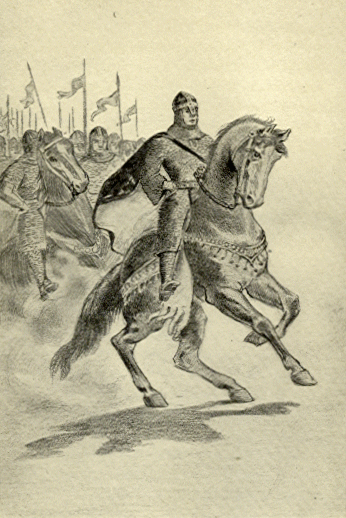
Though he thus professed, however, to rely on Henry, he really trusted most, it seems, to his own right arm; for, as soon as this battle was fairly over, and while the whole country was excited with the astonishing brilliancy of the exploit performed by so young a man, William mounted his horse, and calling upon those to follow him who wished to do so, he rode at full speed, at the head of a small cavalcade, to the castle at Arques. His sudden appearance here, with the news of the victory, inspirited the besiegers to such a degree that the castle was soon taken. He allowed the rebel earl to escape, and thus, perhaps, all the more effectually put an end to the rebellion. He was now in peaceable possession of his realm.
He went in triumph to Falaise, where he was solemnly crowned with great ceremony and parade, and all Normandy was filled with congratulations and rejoicings.

